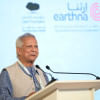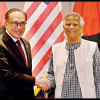Investigated enough!
The UN Security Council asked the Myanmar military to let it investigate rights abuses in Rakhine, but was told the “internal matter had already been investigated enough” and those responsible had been punished.
During a recent discussion between a UNSC delegation and Myanmar's top generals in Naypyitaw, the army said reports of abuses in Northern Rakhine had been exaggerated and the Muslim minority fled to Bangladesh because of threats by terrorists.
The details of the talks are available in the official Facebook page and the official website of Sen Gen Min Aung Hlaing, commander-in-chief of Myanmar armed forces.
Permanent Representative of Sweden to the UNSC Olof Skooh, also a member of the visiting UNSC delegation, said several top army generals were told at the April 30 meeting that the Security Council was deeply concerned about reports of rights abuses in Myanmar.
The UNSC wanted to investigate those cases and Skooh asked the army for its views on the issue.
Aung Hlaing claimed it was an “internal matter” and the reports of abuses were exaggerated by certain groups to drag the international community into Myanmar.
He added an investigation commission, led by a vice-president, and a Tatmadaw investigation, led by Lt Gen Aye Win, carried out probes into accusation of rights violation in 2012 and 2016 and punished the offenders.
“All the findings are true and correct. Then, action was taken against the offenders and those responsible,” Aung Hlaing claimed.
He said some organisations went to Myanmar and tried “to do what they wanted to do” and this could have far-reaching impacts on the country. “For us, we have investigated enough already. But it is actually not up to the army to let the UNSC investigate human rights abuses. Only the government has the authority to do that.”
The army chief's comments came at the end of a four-day mission to Bangladesh and Myanmar by the UNSC team. During its trip to Bangladesh on April 28-30, the delegation met some Rohingya refugees who had fled Rakhine amid a brutal military crackdown on them.
The refugees told the UNSC team tales of systematic atrocities, sexual violence, rape, and killing by members of the security forces, adding, they wanted to return but did not feel it safe.
About the Myanmar army chief's assertion that the Rakhine case was an internal affair, Kelley Currie, deputy permanent representative of the US to UN, said this was clearly not so since 700,000 people had to escape to another country.
The situation demands that the UNSC take action as the case has become an international affair and an issue which could affect international security and peace, he added.
Permanent Representative of Kazakhstan Kairat Umarov said many refugees told stories of how they were raped. “For us, it was difficult to know how to believe it,” he said, adding that the UN envoys wanted Myanmar to agree to the investigation.
“There were a total of 1,116 rape cases in 2016. Army personnel were involved in 16 of those cases and the army punished all of the perpetrators with 20-year prison sentences. Even though there were 1,422 reported cases of rape in 2017, army personnel were involved in just 17 cases, and the convicted assailants were again sentenced in prison terms of 20 years,” Gen Min Aung Hlaing said.
He added the army would not have launched its offensive if armed men had not attacked police bases and local people. “A total of 72 local people were killed in attacks by Bangalees between 2012 and 2018 and 13 others were wounded,” he said, using the military's preferred term for the Rohingyas, implying they are interlopers from Bangladesh.
Gen Aung Hlaing further said there were several reasons why the refugees were afraid to return. Some had fled to Bangladesh as they were involved in the attacks on the police bases and army units or had killed local Buddhists, he claimed.
Besides, the Arakan Rohingya Salvation Army (ARSA), which had orchestrated the attacks on the security forces, did not want them to return. The ARSA, which the Myanmar army calls a terrorist group, had threatened to kill those who would come back, he said.
Violence first broke out in Rakhine in 2012. It worsened in 2016 when armed men attacked several police bases, killing security officers and looting many guns. The ARSA attacked again last year, but when the army launched a counter offensive, the attackers ran away without achieving their goals, he added.
Permanent envoy of Peru to the UNSC Gustavo Meza Cuadra Velasquez asked about Tatmadaw's plans for the security of the refugees after their return.
Anatolio Ndong Mba, permanent representative to the UNSC from Equatorial New Guinea, raised the issue of planting landmines by the Tatmadaw so that refugees cannot safely return.
Permanent Representative Karen Pierce from Britain asked how many soldiers were sent to the conflict region regarding the incident that occurred on August 25, 2017.
Deputy Permanent Representative from China Wu Haitao said they were waiting for progress in rapid and effective implementation of the repatriation issue. He expressed the hope of rapid return of refugees through bilateral cooperation between the two countries.
Dmitry Polyanskiy, deputy permanent representative of Russia, said the senior general might have known descriptions in international media as such accusation creates anxieties for them. He expressed his desire to know how to solve such accusations in a transparent manner. He also raised the issue of Myanmar's deployment of more number of strength at the border.
In response to the questions and discussions of the representatives, the senior general said it was estimated that those who attacked the security troops and villages last year were between 6,000 and 10,000 of strength.
He claimed the Tatmadaw deployed its strength between 1,000 and 2,000.
“There are claims that the Tatmadaw have been committing crimes across the country. We have investigated all the allegations and punished all the perpetrators,” the army chief said.
On repatriation of refugees, he said, “We said we are ready for repatriation as of January 23, 2018. However, Bangladesh is very slow in response. We are ready to start repatriation according to the bilateral agreement.”
On security deployment, the army chief said, “Bangladesh is worried that we have made military preparations, but we did not. I assume that Bangladesh said it because of excessive concerns.”
‘CHINA RESISTS UK PUSH AT UNSC'
China was resisting a British push at the UNSC for a statement calling on Myanmar to try those responsible for attacks on the Rohingya, according to a draft seen by AFP yesterday.
Back from a visit to Myanmar and Bangladesh last week, the Security Council was holding negotiations on a statement that would spell out how to address the crisis from the forced exodus of 700,000 Rohingyas from Myanmar.
Britain last week circulated a text that stressed the importance of "credible and transparent investigations" of human rights violations and urged Myanmar to hold those responsible for the violence to account.
China, a supporter of Myanmar's former ruling junta, on Monday put forward an amended statement that dropped all mention of investigations or accountability, reports AFP.
China's draft statement stresses “the need to address the root causes of the issue” and calls for investment in Rakhine to “achieve stability through development”.
Diplomats said Britain, backed by France and the USA, had rejected the proposed changes by China and negotiations were continuing.
The UNSC had adopted a statement in November that called on Myanmar to rein in its military, but there has been no resolution, a stronger measure that China would likely block as one of the veto-wielding permanent members.
Myanmar has rejected accusations from the UN, Britain, France and the USA of ethnic cleansing.

 For all latest news, follow The Daily Star's Google News channel.
For all latest news, follow The Daily Star's Google News channel. 








Comments